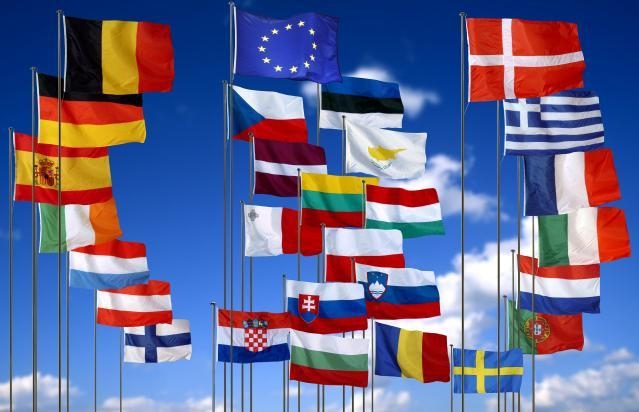EU-Knowledge
The European Union (EU) is a unique economic and political union of 27 European states. It is founded on shared values based on democracy, the rule of law, and respect for human rights. After many centuries marked by war, conflict, and poverty, we now find ourselves—through integration and cooperation—in the longest period of peace in European history, with relative prosperity for all people.
The EU and its actors at all levels repeatedly face obstacles, crises, and criticism. Yet the decades have shown: there is no better alternative for addressing global challenges than continuous cooperation within the community—especially at the regional and local levels. United in diversity—it is well worth learning more about it.

Which key topics are discussed at the EU level and incorporated into national laws? How does the EU affect my everyday life? There are many examples: the abolition of roaming charges, the EU-wide charging cable standard (USB-C), attached caps on plastic bottles to reduce environmental plastic waste, and Erasmus+, the EU program for education, training, youth, and sport.Those who want to know what the EU is currently supporting in their own region can find an excellent overview on this multilingual, interactive website:
https://what-europe-does-for-me.europarl.europa.eu/de/home
EU-News
There are now several informative, cross-border, and freely accessible information portals offering a good overview of current topics and events. The goal is to foster a cross-border European public sphere.
| The official EU portal for news and events: www.europa.eu https://european-union.europa.eu/news-and-events_en Europe by Satellite (EbS) is the European Union’s TV information service, providing freely accessible audiovisual material via satellite and online: https://audiovisual.ec.europa.eu/en/ | European Youth Infos: the portal for young people and young adults offering news, announcements, and information: https://youth.europa.eu/home_en Euractiv is a multilingual news portal based in Brussels that covers topics related to the European Union: www.euractiv.de |
| Display is a journalistic portal and at the same time a technical infrastructure aimed at end users in the EU. As a technical infrastructure, the project relies on open and free technology as well as Creative Commons: https://displayeurope.eu/de/ Voxeurop is an independent online media company with a European perspective, operated by a European press cooperative. It consists of an “open community” of journalists, translators, partner media, readers, and members from more than 30 countries: https://voxeurop.eu/ | European Press Review (published by the Federal Agency for Civic Education in Germany) provides an overview of current debates in Europe’s media: www.eurotopics.net and, for general event information in Bavaria: https://www.blz.bayern.de/ European Newsroom of the news agencies: a cooperation project involving news agencies from across Europe: https://europeannewsroom.com/de/ Eurozine is a platform for European cultural media—a network bringing together over 100 journals, magazines, and institutions from most European countries: https://www.eurozine.com/ |
| Euronews is Europe’s international news channel, providing global, multilingual news to more than 400 million households in 160 countries: https://de.euronews.com/ The European Centre for Press and Media Freedom is a non-profit organization based in Leipzig, founded on the principles of the European Charter on Freedom of the Press and fundamental rights. An interactive map highlights violations of these principles: https://www.ecpmf.eu/ | POLITICO is a global, nonpartisan news organization headquartered in Brussels, with additional offices in London, Berlin, and Paris: https://www.politico.eu Information from the European Data Journalism Network: https://www.europeandatajournalism.eu/category/news/ Also interesting: Association of European Journalists |
For everyone who prefers to get their information via social media, there are now plenty of meaningful news channels about Europe—and it’s also possible to follow many Members of the European Parliament directly. Here are a few examples, including some useful links for job searches.
| The European Commission on Instagram – useful information for young people: @european_youth_eu | Short, entertaining European news on TikTok (in English), for example: https://www.tiktok.com/@europa.news Also a reliable German-language source: https://www.tiktok.com/@europa_nachrichten |
| The European Commission’s official Facebook page: https://www.facebook.com/EuropeanCommission Germany-focused and relevant: FakeNews-Populistenwatch group on Facebook: https://www.facebook.com/groups/174733089948664 | If you are interested in an international job, internship, or exchange opportunity in Europe, you can find more information here: https://www.eurobrussels.com/ https://apply4ep.gestmax.eu/search/index/lang/de_DE https://www.coe.int/en/web/jobs https://europeanmovement.eu/get-in-touch/#careers |
More EU-Information
How does the EU function as a structure “sui generis”—of its own kind—different from our national states? Who are the decision-makers at the regional, national, and European levels? Who are our local representatives? And where can citizens get information and become involved “close to home”? Here are some useful links:
- European Parliamentary Research Service (EPRS):
The EPRS provides comprehensive research and analytical support to Members of the European Parliament, its committees, and the Parliament as a whole. Its guiding principle is to provide independent, objective, and authoritative information.
https://epthinktank.eu/about/* - Fact-Checking Tool:
https://epthinktank.eu/2024/07/11/fact-checking-compass-how-to-spot-information-manipulation/ - Publications Office of the European Union:
Includes current calls for tenders, research results, “Who’s Who,” and more.
https://op.europa.eu/de/home - General information about Europe:
https://europainfo.at - Central contact point and EU networks offering information, services, and support. The interactive map “The European Union near me” shows EU centers in your local area.
https://european-union.europa.eu/contact-eu/meet-us_de - Europe Direct Information Centres:
https://germany.representation.ec.europa.eu/kontaktieren-sie-uns/europe-direct-deutschland_de - European Citizens’ Initiative (ECI):
This instrument allows citizens to bring topics directly to the European Commission in a participatory, grassroots-democratic form.
https://citizens-initiative.europa.eu/_de
(Tutorial video available here:) https://citizens-initiative-forum.europa.eu/_de - Results of the 2024 European Parliament elections, including the composition of the Parliament and voter turnout, broken down by country:
https://results.elections.europa.eu/de/index.html?utm_campaign=240711_NEW_EP&utm_source=DE_NEW_EP&utm_medium=Email
So who actually decides what—and how do the EU institutions work? Here are some insightful examples …
| Short TV segment by Phoenix about the EU institutions (2 minutes 30 seconds): https://www.youtube.com/watch?v=w_ItC4rCEqE Poster download about the European Parliament: https://www.blz.bayern.de/plakatserie-zu-den-eu-institutionen_p_494.html | Have 15 minutes and an interest in a bit of EU history? Terra X tells the story here: https://www.youtube.com/watch?v=x-HUsTQMQeo Podcasts: https://epthinktank.eu/podcasts/ | Fact-checking – more important than ever: https://www.youtube.com/watch?v=2iiEeCQeSSA How does the EU act in times of crisis? ARTE provides a concise 12-minute overview: https://www.youtube.com/watch?v=o4nb1cE4wJY |



Contact
Do you have any questions, requests, or suggestions? Simply write to:
office@europaeische-akademie-inntal.org
